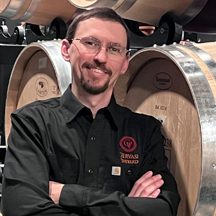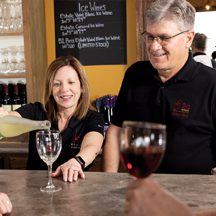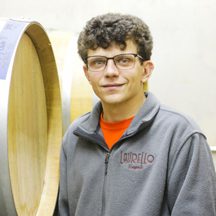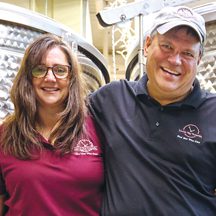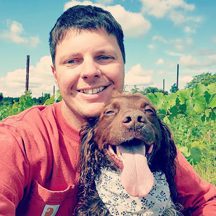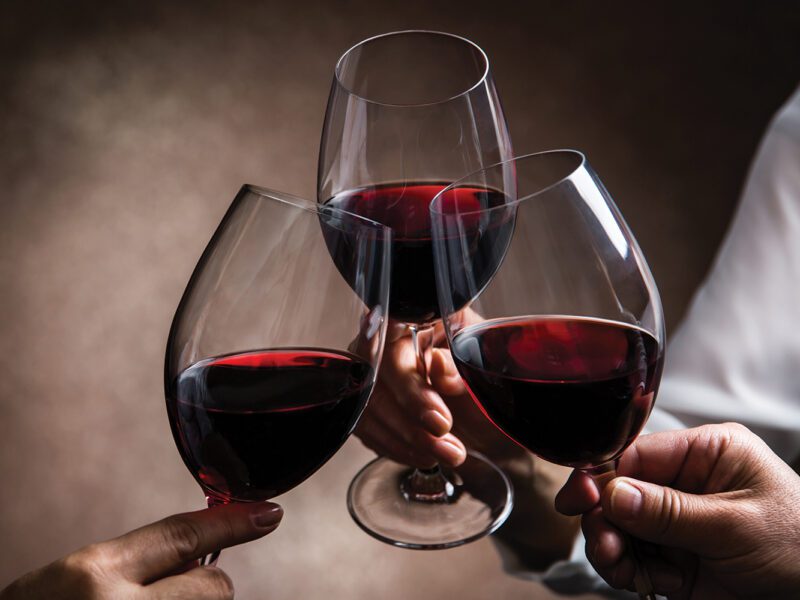
DAVID SMITH, head winemaker
Gervasi Vineyard – Canton, Ohio
gervasivineyard.com
What ignited your passion for wine and winemaking?
DS: Well, in 2006, I got a biochemistry degree from a small school in Wisconsin. I did a research project using black currants and honey to make dry mead. I analyzed the sugar and acid content of black currants as they ripened, to determine the best time to pick the currants to produce a dry mead.
How’d you learn to make wine?
DS: I worked at a winery while I was doing my research project in college. I helped with bottling, corking, or whatever needed to be done. After graduation, I was employed as a cellar worker. I did 95% of the cellar work as an apprentice and learned a lot from the owner/winemaker. I helped him upgrade his lab, and he taught me a lot about sensory evaluation and process.
Would you describe winemaking as an art, a science, or process management?
DS: All three. Much like a chef who has to understand the chemistry behind food, a winemaker has to understand the science or chemistry behind winemaking. You can still make a good wine without that knowledge, but it’ll take a lot longer to get to the expert level. And quality control and process are critical; it’s one step after another, raw grapes to finished bottle.
Does customer opinion/feedback influence your winemaking?
DS: Sometimes inspiration comes from our guests. If we hear about something intriguing, we look at national trends to understand if anyone else is making it; if it’s becoming popular; what the price point might be. And I routinely touch base with our restaurant and bar team to get feedback on what’s most popular.
What’s the most challenging part of the harvest?
DS: In general, the harvest is physically and mentally demanding. It’s a marathon, and you need to be able to maintain a consistently high pace for 6 weeks (or more)!
What’s your favorite food and wine pairing?
DS: Gervasi’s Piove Riesling with the Crispy Fig Crostata (dried figs, cream cheese, roasted walnuts, clover honey in phyllo dough) that’s served at the Gervasi Crush House.
If you found yourself alone on a desert island, which wine would you want to have with you?
DS: Probably sparkling rosé. But from a strictly practical standpoint, maybe a Port, because Port holds up over time, it could stand up to high temperatures, and it has a high alcohol content that could come in handy as an antiseptic!
TONY KOSICEK, owner, winemaker
Kosicek Vineyards – Geneva, Ohio
kosicekvineyards.com
What ignited your passion for wine and winemaking?
TK: We’re third and fourth generation grape growers, and initially, we didn’t actually plan to make wine at all! But ultimately, we decided to start a small winery, and once we did, we became winemakers!
How’d you learn to make wine?
TK: It was kind of the “School of Hard Knocks.” I had some help at the beginning and made decent wines, but I thought we could do better. Todd Steiner (Enology Program Manager & Outreach Specialist, The Ohio State University) was a great help, and we learned a lot from Jeff Murphy, the winemaker at Johnson Estates in New York.
Would you describe winemaking as an art, a science, or process management?
TK: It’s all three. You have to have a good plan to start with. Science is the next part; you have to follow the rules. Art is the final piece of the puzzle, before the wine goes into the bottle. We host “Wine Wednesday” tastings with friends who’ve helped us bottle, and with the tasting room team. As winemakers, we’re all subject to “cellar palette.” When you’re tasting wines every day, your mind starts to tell you what a wine is going to taste like…and then someone less partial tells you what it really tastes like.
Does customer opinion/feedback influence your winemaking?
TK: It does. Not everyone wants a cab or a pinot. As winemakers, we need to pay attention to customer preference and to the direction of the overall market. A good way to go broke is to make only what you like to drink. We’ve got 23 or 24 labels right now; and we just released a Sparkling Riesling.
Are there any special traditions at Kosicek Vineyards?
TK: Being present. People who visit the vineyard and the tasting room want to see us. So, at any given time, either my wife, Mauri or I are on site, and so is Brix, our dog, and of course, the great ladies in the tasting room. Everybody loves Brix. We had visitors recently who said, “you know the best thing about your vineyard? Brix! And your wines are pretty good, too!”
If you found yourself alone on a desert island, which wine would you want to have with you?
TK: Our Sparkling Riesling, because I’m on an island! Or maybe a nice, grassy, Sauvignon Blanc!
SHANE HORSTMANN, winemaker
KIM LAURELLO, owner, winemaker
Laurello Vineyards – Geneva, Ohio
laurellovineyards.com
What ignited your passion for wine and winemaking?
KL: My husband, Larry said, “Let’s open a winery.” Producing quality wines with passion and hard work is important and essential. The wines we produce not only reflect our artistry, but our family name.
SH: My first job at a winery, where I not only grew grapes, but made wine from the fruit.
How’d you learn to make wine?
KL: I did an immense amount of reading and I learned from my husband, Larry. I also reached out to Todd Steiner (Enology Program Manager & Outreach Specialist, The Ohio State University) and Ed Trebets (Program Director for Kent State Ashtabula’s Wine Degree Programs). I’ve never been ashamed to ask questions, and I’m always learning.
SH: The core of my education in winemaking came from my first employer. I continued learning throughout my mentorship and I continue to read extensively on the subject. Experience has been my greatest teacher.
Would you describe winemaking as an art, a science, or process management?
KL: At Laurello, winemaking is both an art and a science. As a Dental Hygienist with a background in science, I can appreciate that wine is a living organism that changes throughout production. As a winemaker, I artistically approach the style of our wines.
SH: For me, winemaking is a process dependent on science.
Does customer opinion/feedback influence your winemaking?
KL: Our customers are most definitely heard. We try to perfect our wines to please our guests. Mother Nature influences our production every year.
SH: We make our wine for our customers. Customer feedback is of the utmost importance.
What’s the most challenging part of the harvest?
KL: Organizing logistics for machine-picking and hand-picking the grapes.
SH: Successfully adapting to circumstances that affect each vintage; low yields, disease pressure, fruit immaturity, to name a few.
Are there any special traditions at Laurello Vineyards?
KL: Every April, for the past 15 years, we’ve offered a special “Wine for the Cure” menu that benefits Making Strides Against Breast Cancer.
SH: We celebrate the Bacchus Festival every spring; it’s a celebration of food and wine pairings and tastings. Kim and a guest chef prepare delicious foods that enhance our wines and delight our visitors.
If you found yourself alone on a desert island, which wine would you want to have with you?
KL: Off-dry Gewürztraminer
SH: Any wine that would be light, crisp and refreshing.
JIM BORTON, owner, head of operations
SHERRI BORTON, owner, chief blending officer
Lincoln Way Vineyards and Winery – Wooster, Ohio
lincolnwayvineyards.com
What ignited your passion for wine and winemaking?
JB: It’s winemaking by committee here, but we blame it on Sherri! In high school, she travelled to the Champagne Caves in France, where she absorbed and loved the French culture. After college, she went to work for a distributor. Now Sherri’s our Chief Blending Officer! Sherri and Ari – our daughter and wine analyst/“lab rat” – have quite the palates. Our son, Alex, manages the vineyard and assists with production (“cellar rat”), and the two of us work the crush pad.
How’d you learn to make wine?
SB: It was a long learning process when we first started growing grapes!
JB: For the first batches, we played with kit wines. Turns out you can’t drink ‘em, and you can’t sell ‘em! So, we expanded to fruit-based wines, and not only could we drink them, but we could sell them.
Would you describe winemaking as an art, a science, or process management?
JB: All of the above! If you ignore science, you have trouble. If you ignore recipe, you have trouble. And there’s definitely an art to the final blend.
Does customer opinion/feedback influence your winemaking?
SB: That’s part of the reason we produce wines with three levels of sweetness…to appeal to different palettes. At the end of the day, though, the main goal is to produce wines with appropriately balanced acidity and sugar.
What’s the most challenging part of the harvest?
JB: Alex manages the vineyard and runs the pick crew. Fall is when everything happens. There are sports and 4H activities and finding the time to fit everything in gets tricky. And we have multiple vineyards to pick, so the logistics can be a real challenge.
Are there any special traditions at Lincoln Way Vineyards and Winery?
JB: We’re a family-operated winery, so it’s all about working together. We invite members of the local Future Farmers of America chapter to pick during harvest. And we feed them! Some of them come back after they graduate, just for the food!
If you found yourself alone on a desert island, which wine would you want to have with you?
JB: Something high enough in alcohol that you could use as fuel! Nope…wines don’t catch fire! So maybe our One Fifty-Five Ohio Rosé! Or better still, a mixed case; white for seafood and red for wild game.
JOE JUNIPER, owner, winemaker
Vermilion Valley Vineyards – Wakeman, Ohio
vermilion-valleyvineyards.com
What ignited your passion for wine and winemaking?
JJ: My love of plants and the vines led me to it! When I was 13, I picked, pruned, pulled leaves and hedged vines in a vineyard within pedaling distance of my home. I entered the cellar when I was 15 and helped with bottling, corking and anything else that needed to be done. But it was when I was old enough to actually taste the wine, that it all really came together.
How’d you learn to make wine?
JJ: I spent three years in the cellar as a kid and gained a lot of knowledge on an amateur scale. Since then, I’ve been very plugged in to science and academic publications. I attend every workshop led by Todd Steiner (Enology Program Manager & Outreach Specialist, The Ohio State University), and I’ve had many great mentors. We’re still learning, still evolving. And our best wines are yet to come!
Would you describe winemaking as an art, a science, or process management?
JJ: All three! We started with 12 acres of grapes, and we’ll have close to 120 acres of grapes by year end. Scaling up ten-fold with vineyards on five properties means winemaking is very much about logistics for us. We have a science-first mentality in the vineyard. But we lean toward free-flowing, artistic expression in the cellar.
Does customer opinion/feedback influence your winemaking?
JJ: No. Never! We don’t make wine to sell. We make wine to be the best expression of that grape in that given year, and hopefully, there will be someone to appreciate and buy it. I think this is the only way to combat extreme vintage variation, and to maximize quality.
Are there any special traditions at Vermilion Valley Vineyards?
JJ: My wife, Kristi and I have always done a 100-day countdown to November 1st. The high pace of the season is behind us, we put the previous vintage to rest, and we start working toward the next. It’s essentially our “New Year,” and we mark day 100, day 75, day 50, day 25 and November 1st with a nice dinner and a great bottle of wine!
If you found yourself alone on a desert island, which wine would you want to have with you?
JJ: A fat, buttery, Chardonnay. I could drink it until the day I die! And if a box of waffles happened to float ashore, I’d smear the Chardonnay all over them!

